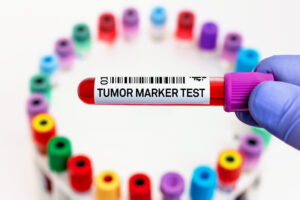 Biomarkers are genes, molecules, or other features present in a person, including in a person’s tumor, that tell doctors something about a person’s health condition. Biomarkers in MBC include the estrogen receptor (ER), progesterone receptor (PR), and HER2, as well as mutations in genes such as ESR1 and PIK3CA. In MBC, biomarkers can predict how likely the cancer is to progress and may also help doctors and patients select the right treatment.
Biomarkers are genes, molecules, or other features present in a person, including in a person’s tumor, that tell doctors something about a person’s health condition. Biomarkers in MBC include the estrogen receptor (ER), progesterone receptor (PR), and HER2, as well as mutations in genes such as ESR1 and PIK3CA. In MBC, biomarkers can predict how likely the cancer is to progress and may also help doctors and patients select the right treatment.
Some clinical trials are testing whether a specific biomarker is useful and in what groups of patients. In other clinical trials, biomarkers that were shown to be useful in previous studies are used as eligibility criteria for participation in a trial.
Read below to learn more about what biomarkers are and how they are used in clinical trials.
- American Cancer Society: Biomarker testing can help show what treatments may be helpful, if treatment is working, and whether the cancer is likely to come back
- Food and Drug Administration (video): Biomarkers, which are characteristics of the body that can be measured, can be used in clinical trials to help determine if a treatment is working and is safe
- Genentech (video): Biomarkers are being studied in clinical trials and can predict how likely a patient’s cancer is to progress and what treatments may or may not benefit that patient
- LUNGevity Foundation: This discussion guide can help people ask their providers the right questions about biomarker testing
- LUNGevity Foundation/Living Beyond Breast Cancer: This page describes the importance of MBC biomarker testing and a step-by-step guide to talking about and receiving biomarker testing
Last Modified on June 27, 2024
